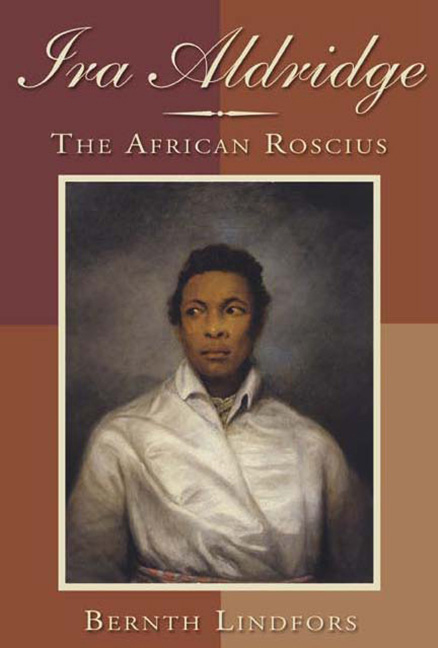Book contents
- Frontmatter
- Miscellaneous Frontmatter
- Contents
- List of Illustrations
- Acknowledgments
- Introduction
- Part One: The Life
- Part Two: The Career
- 8 Ira Aldridge's Fight for Equality
- 9 Ira Aldridge in Manchester
- 10 Acting Black: Othello, Othello Burlesques, and the Performance of Blackness
- 11 Ira Aldridge: Shakespeare and Minstrelsy
- 12 “Mislike me not for my complexion … “: Ira Aldridge in Whiteface
- 13 Ira Aldridge as Macbeth and King Lear
- 14 Creating the Black Hero: Ira Aldridge's The Black Doctor
- 15 The First American on the Zagreb Stage
- 16 A Heartwarming, Radiant Othello in the Netherlands, 1855
- 17 Ira Aldridge's Performances in Meiningen
- 18 “Othello's Occupation's Gone!” The African Roscius in Poland, 1853–67
- Notes on Contributors
- Index
- Miscellaneous Endmatter
10 - Acting Black: Othello, Othello Burlesques, and the Performance of Blackness
from Part Two: The Career
Published online by Cambridge University Press: 26 October 2017
- Frontmatter
- Miscellaneous Frontmatter
- Contents
- List of Illustrations
- Acknowledgments
- Introduction
- Part One: The Life
- Part Two: The Career
- 8 Ira Aldridge's Fight for Equality
- 9 Ira Aldridge in Manchester
- 10 Acting Black: Othello, Othello Burlesques, and the Performance of Blackness
- 11 Ira Aldridge: Shakespeare and Minstrelsy
- 12 “Mislike me not for my complexion … “: Ira Aldridge in Whiteface
- 13 Ira Aldridge as Macbeth and King Lear
- 14 Creating the Black Hero: Ira Aldridge's The Black Doctor
- 15 The First American on the Zagreb Stage
- 16 A Heartwarming, Radiant Othello in the Netherlands, 1855
- 17 Ira Aldridge's Performances in Meiningen
- 18 “Othello's Occupation's Gone!” The African Roscius in Poland, 1853–67
- Notes on Contributors
- Index
- Miscellaneous Endmatter
Summary
In 1833, London audiences had the opportunity to see, for the first time in the play's history, the role of Othello played by a black actor. This actor was the New Yorker Ira Aldridge, who in 1825 had left the United States to pursue his career in Europe. Aldridge's Covent Garden Othello came five months after the wildly successful production of that play at Drury Lane, in which Edmund Kean played Othello with William Macready as Iago. To pique renewed public interest in the play so soon after such a theatrical event, the Covent Garden management added a special emphasis to its advertisements for Aldridge's London debut: “MR. ALDRIDGE, Known by the appellation of the AFRICAN ROSCIUS,” is now further identified as “A Native of Senegal.” New roles have been added for the engagement as well; he will also appear in “the Tragedy of THE REVENGE” as the Moorish antihero Zanga, “After which, the musical Entertainment of THE PADLOCK,” with Aldridge in the role of Mungo.
A third manifestation of the London playgoing public's heightened awareness of Othello during the early 1830s was provided by Maurice Dowling's Othello burlesque of 1834, premiering at Liverpool's Liver Theatre. Dowling's Othello, “Moor of Venice, formerly an Independent Nigger, from the Republic of Hayti,” speaks the minstrel show black dialect first popularized in England by Charles Mathews on his return from an 1822–23 American tour. He is convinced of Desdemona's guilt by her loss not of a handkerchief endowed with magical powers but of a bath towel, and sings his version of “It is the cause” to the tune of “King of the Cannibal Islands.”
These versions of Othello mark, I suggest, critical moments in the history of the play's staging of race and racial difference. Apparently, since its first performance at the Jacobean court, Othello had featured a white man in blackface in the title role. Edmund Kean's “tawny” Othello of 1814 revised this tradition, formally linking the erasure of the Moor's black body to his successful impersonation of “those minute differences and delicate shades which constitute the very essence of character.”
- Type
- Chapter
- Information
- Ira AldridgeThe African Roscius, pp. 135 - 156Publisher: Boydell & BrewerPrint publication year: 2007

